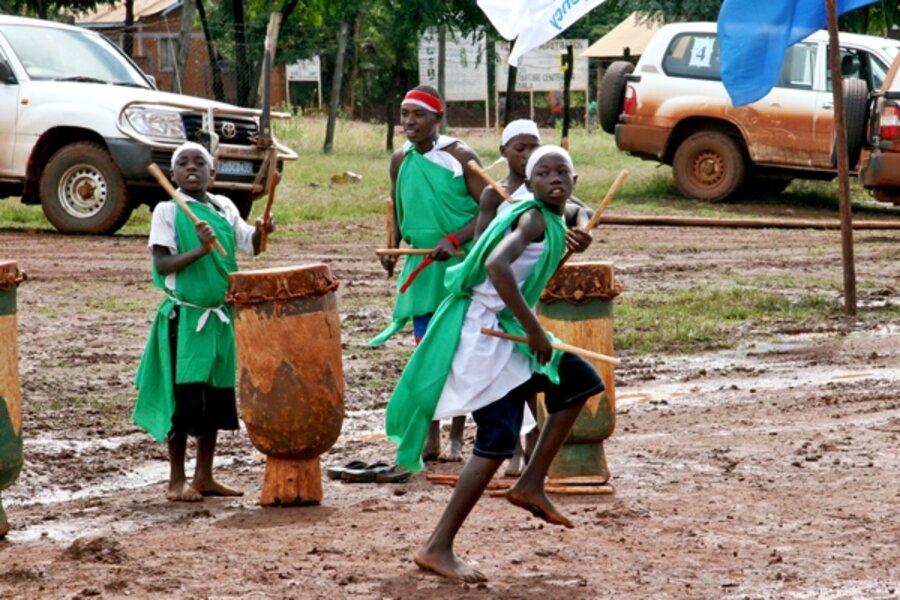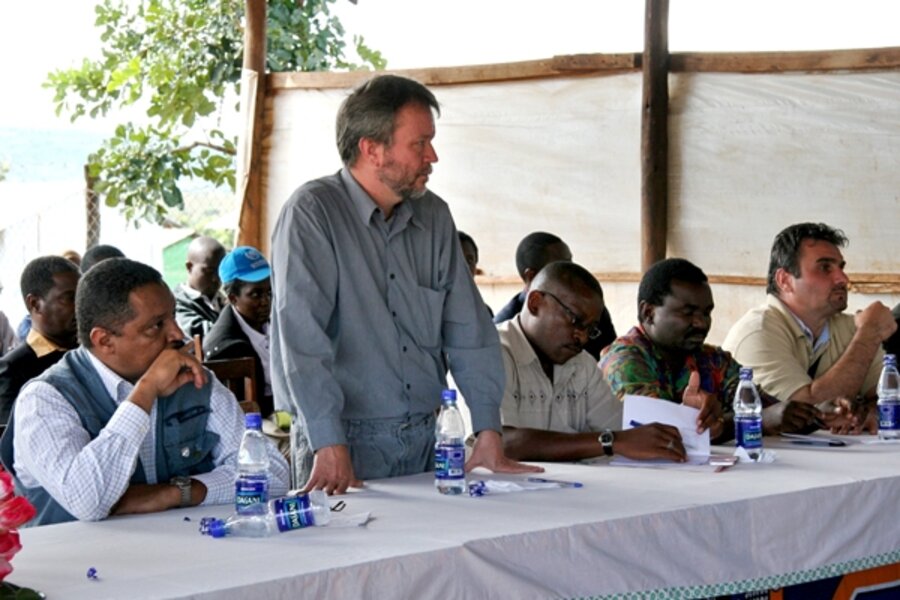The ambassador’s visit
Loading...
It was an awkward assignment. When acting US Ambassador to Tanzania Larry Andre pulled into Mtabila refugee camp in April, in a convoy of mud-darkened Land Cruisers that disgorged a crowd of United Nations and government officials and embassy personnel, he looked uncomfortable.Before he stepped into the thick orange mud, I had never actually seen my country being represented overseas, person-to-person. Larry, a veteran Africa hand, had arrived at this camp of 40,000 Burundians in northwest Tanzania to deliver an uncomfortable message: Uncle Sam does not want you. What I saw that afternoon made me both proud and embarrassed to be an American. Here was the scene: After a rainy morning talking with the Rukundo family, and lunch at "the Sheraton," I followed UN officials to a fenced-in area at the entrance to the camp. Workers were erecting a banner that read, in English and the Burundian language of Kirundi, "The best solution for refugees is voluntary repatriation." That is, return to their now-peaceful homeland.The rain had just let up, and very few refugees lined the benches of the large shelter where a long table had been erected and spread with artificial flowers and bottled water. The UN folks went to round up more; the seats were packed with thin, exhausted-looking refugees by the time the convoy arrived.When the eight Land Cruisers pulled under the banner and through the gate, a drumming group of Burundian teens fired up. Leaping and whooping, barefoot in the sticky mud, they gave a heartfelt performance as officials took their seats. When they'd finished, several dozen officials were seated facing nearly 200 refugees, with an interpreter in between.I don't know what I'd imagined an ambassador would look like, but Larry wasn't it. His appearance seemed calculated not to show up the refugees he was visiting: a salt-and-pepper beard, overgrown grey hair, and a rumpled grey shirt and pants. I had met him in Dar es Salaam a few days before, at the US Embassy in Dar es Salam, looking considerably more formal. At first I didn't recognize him.After some preliminaries by UN and Tanzanian officials - mostly scolding, and occasionally mocking, the refugees for their hopes of being resettled in the US - he rose and addressed the crowd. Unlike those before him, Larry spoke in rough, polite French. First, he apologized for making the refugees wait, and thanked the young drummers for their performance.Then, he empathized. "Everyone understands you have suffered a lot," he told the refugees. "It is not easy to flee your country when war threatens your life."Unfortunately, he told them, there was no US program that could resettle all of them. "I know it's not at all easy to flee in the first place, to stay in a strange land for a long time, and it's not at all easy to go home and rebuild. But that's the road in front of you," he said. "In the past years your country has made progress, and now your country needs you."Then he took questions. Refugees stepped up respectfully to ask: What about people with disabilities? What about families divided by a US policy that made no provision for children born and spouses married in the decades between their registration and resettlement in the States. Larry consulted with the man seated to his right, Yacoub el Hilo, head of UN refugee operations in Tanzania, and the two men took turns answering, stressing that yes, the US made mistakes, but no, there was no hope of reunification now.To a woman who asked about the possibility of building a new house in Mtabila, Yacoub said incredulously: "Madam, please build that house in Burundi."
As the visit drew to a close, a preselected refugee - whom, coincidentally, I had just interviewed about his recent failed attempt to return to Burundi, and the death threats he'd faced there - made an obsequious speech of thanks, hoping aloud that his fellow refugees would heed the message to return home.
And with that, as suddenly as they'd arrived, the officials hopped into their 4x4s and were gone.
The background is this: In 1972, and again in 1993, Burundi experienced pervasive Hutu-Tutsi ethnic killings - Burundians call them genocide - la its neighbor Rwanda. Today the violence has quieted, and hundreds of thousands of refugees have returned home.The question is: To what? All abandoned their land and livelihoods in their flight, and it has long since been claimed by countrymen who stayed. Some returnees have found their lives threatened by squatters, and pervasive fears linger among Mtabila's remaining residents that returning would be a death sentence. These folks say the $50 bonus families receive for registering voluntarily is nowhere near worth the risk they'll face if they return.UN, Burundian, and Tanzanian officials disagree. Burundi is at peace now, they say, and those recalcitrant refugees who remain in the camp are looking for handouts or nursing false hopes of a cushy resettlement life in the US or Europe. There's little middle ground between these positions.In some ways, the newly installed acting Ambassador's speech broke the impasse, by not subscribing to the idea that the refugees to whom he spoke were mistaken about the challenges they faced. Many colleagues had earlier praised him to me, and I could see why. He'd done as graceful and sensitive a job as he could, given the premise of a visit that didn't leave time for officials to see more of the camp than the front gate.And as we explore in this series' most recent print story, the US resettlement program truly is more overtaxed and underfunded now than at any point in history. It accepts a maximum of 75,000 refugees a year. It couldn't possibly take in Mtabila's remaining residents - several of them friends of Bill Clinton's family who've waited more than a decade for a permanent home anywhere in the world.But the convoy traveled to three camps or settlements over several days, flying in a private plane, and staying in the province's fanciest ($80 per night) hotel. Looking over the itinerary, it struck me as pretty raw that they'd gone to such effort and expense to pop by with the message: "Quit hoping. Our country doesn't want you."
My country, I thought, as I clambered into a UN Land Cruiser and started the long ride down the mud road behind them.
Travel for this project's Africa reporting was funded in part by a grant from The Pulitzer Center on Crisis Reporting






